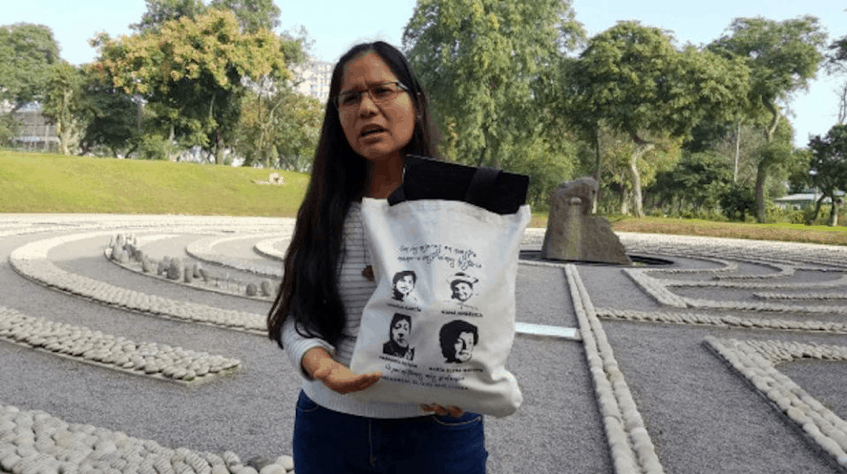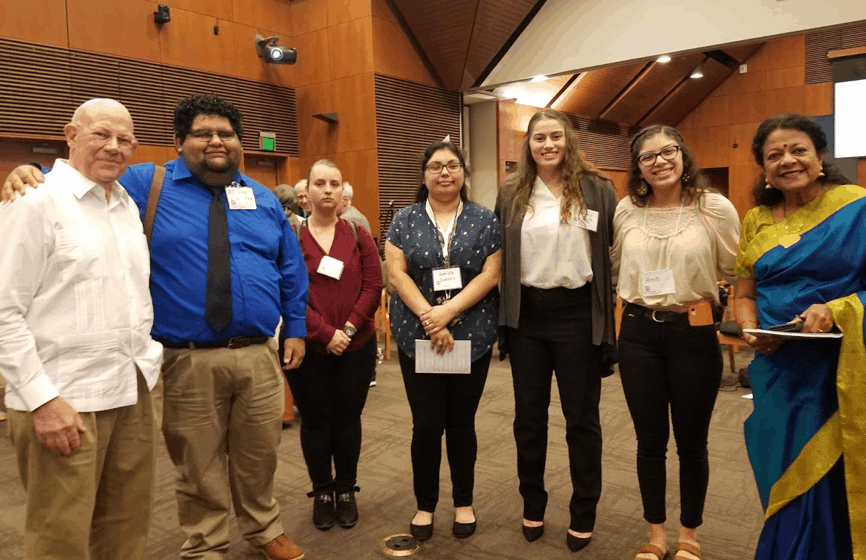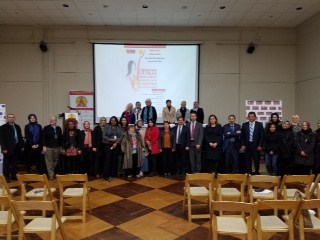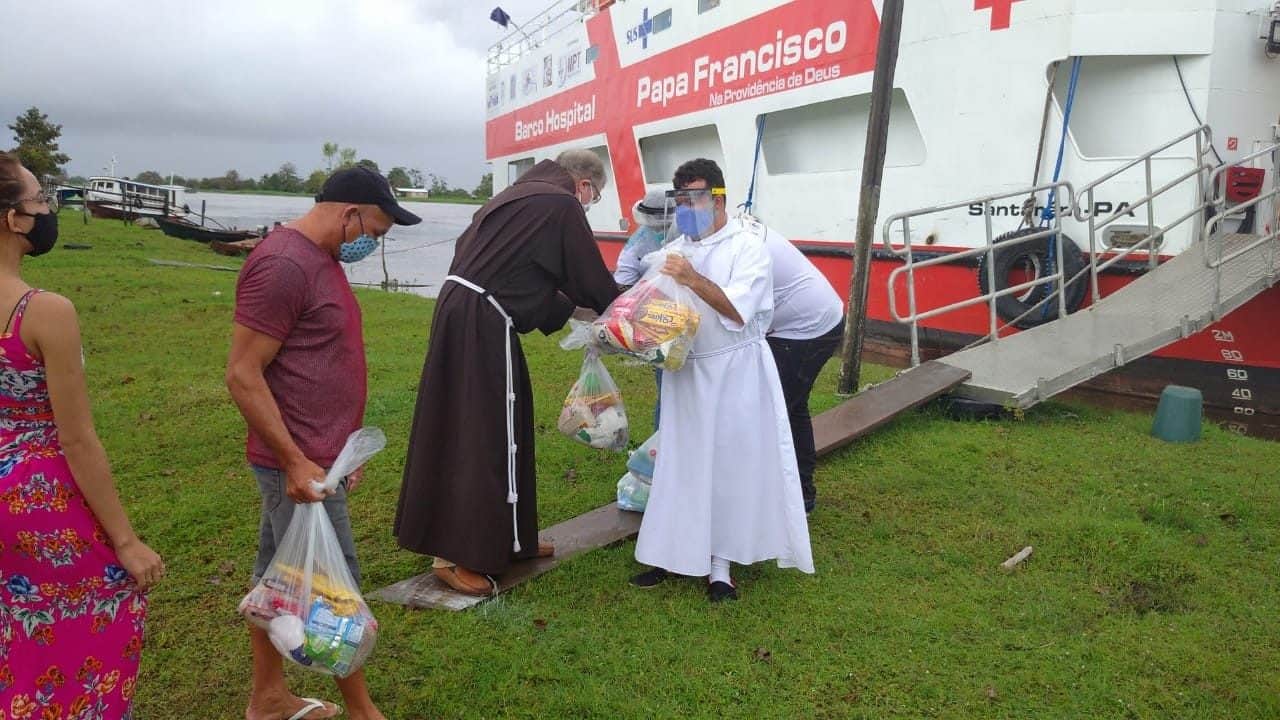By Sister Martha Ann Kirk, CCVI
The confinement from fear of the pandemic could not keep UIW Cardinals from serving on the day they were to be all over the city volunteering with “Cardinals in the Community,” March 21, 2020.
“Cardinals Serving Online” was a virtual gathering that had speakers from India, Peru, San Francisco, CA, and St. Louis, MO, informing and inspiring students and professors, answering questions, and teaching skills for advocacy and action in the face of child bondage, exploitation of women, human trafficking, and children in detention. The Sisters of Charity of the Incarnate Word, who founded UIW consider the “promotion of human dignity” a central issue and have been emphasizing solidarity with vulnerable children, immigrants, and victims of trafficking.

Anuradha Bhosale speaking by ZOOM from Kolhapur, India, where it was night while the San Antonio listeners were just starting their day.
Anuradha Bhosale, a highly cherished hero to thousands of impoverished children because she has gotten them out of forced labor, spoke from India about the Avani, the organization she leads. A UIW Student from the Social Justice Leadership class Stephanie Smith, wrote of what she learned: “There is an estimated number of 964,619 children under the age of 14 working as child laborers (After the Unspeakable, We Speak Hope). Bhosale also mentioned how young girls drop out of school once their menstruation starts, as well as, how young women get sexually abused.”
UIW student Ariana Garcia joined in to emphasize how much we need to think and care about girls being “shamed” in regard to their periods and therefore loosing out on education. The moderator of the virtual gathering Sister Martha Ann Kirk explained that when she researched female education in Iraq she used United Nations information on girls dropping out of school at puberty and she documented a Muslim group successfully educating to change this.

UIW students at the Blessing of the Peacemakers in January, Grisell Meza, Dr. G. P. Singh, a 2020 San Antonio Peace Laureate, Mikkel McKoy, Victoria Heberling, Ariana Garcia and her son, and Sister Martha Ann Kirk.
UIW student Maggie Wilkins asked about legal protection for sexually exploited girls. Bhosale said that there are laws but these do not have enough power because boys have not been given proper values education at the right age. Bhosale has helped develop “gender equality classes for boys where they learn how to treat and respect women while the girls learn how they should be strong and continue to go to school,” noted Smith in her writing.
Native San Antonian, Scott Kafora, now lives in India and has volunteered with Bhosale for the last ten years. He emphasized how university students can partner with them in global problems sharing information and building awareness. Sister Martha Ann noted that unequal treatment and violence against women is not unique to India, San Antonians need to confront the grim facts documented in the Status of Women in San Antonio. UIW Religious Studies major Mikkel McKoy compassionately spoke of his desire to protect his family and how people can unite for protection.
UIW students know Kafora because he was with Arun Gandhi, the grandson of Mahatma Gandhi, in San Antonio in November at a gathering hosted by the peaceCENTER and then spoke at UIW.

Scott Kafora, Cardinal Community Leaders Aly Escobar and Selena Casanova, and Sister Martha Ann Kirk.
Human slavery and trafficking information and ways to combat these were shared by Sister Katty Huanuco of Lima, Peru, the director of the Incarnate Word Sisters Justice, Peace, Creation Office Sister Martha Ann introduced Sr. Katty noting that as one whose Quichua-speaking family was displaced by violence in Peru, she strongly advocates for vulnerable people. Sr. Katty had taught fourteen people from UIW on a Women’s Global Connection trip to Peru last summer guiding students to integrate social justice and compassion.

Sister Katty explaining the “Eye That Cries” monument in Lima with each stone representing one of the 70,000 people killed during the time of terrorism.
Sr. Katty’s practical presentation can help anyone work against slavery now. She urged people to be informed consumers and to research if the companies they buy from are treating people as slaves. Students can do graphics and writing that the Incarnate Word Sisters might use in their international campaigns. For the last few years Sr. Katty has been working with groups in Latin America and Mexico and with groups in the US against trafficking since this horrible practice is a priority of the Incarnate Word Sisters. She said, “Bring these crimes out of the shadows into the light.”

Jennifer Reyes Lay, the Executive Director of US Catholic Sisters Against Human Trafficking speaking from St. Louis, MO, emphasized that “Ending Slavery is Everyone’s Work!” She showed examples from the “Take Action” section of their website guiding students so that they become engaged citizens and skilled in influencing legislation. Trafficking is the second largest crime in the world because it is profitable. If a person works selling drugs, a drug is sold once, but a person can sell the work of a human slave over and over. “This hit me hard because it shows that the people who are selling other humans, do not see the people they are selling as humans, but as an object, they can make money off of,” reflected Smith, a Social Justice Leadership student.
She urged students to be active during this Lenten season when many Christians abstain from meat. People can write to seafood companies to urge them not to exploit workers. “Labeling for Lent is a national initiative urging seafood producers, distributors, and retailers to make public, through product labeling or other means, their efforts to fight human trafficking in their product supply chains.” This is supporting seafarers and fishers’ labor rights. “We will choose to patronize businesses that are committed to buying seafood from wholesalers who are leaders in ensuring that the seafood Americans eat is not harvested by slave labor.”

Hope Frye, spoke from San Francisco, but she works in many parts of the U.S. visiting detention centers where children are held.
Hope Frye, past president of the American Immigration Lawyers Association and founder of Project Lifeline advocacy for the human rights of immigrants, made a poignant plea for immigrant children. Her work is to visit detention centers, interview children about their living conditions, and submit testimonies. PBS News Hour shared her heartbreaking story of a seventeen year old immigrant who had just given birth to a premature baby. (To see Frye taking about her, scroll down Project Lifeline to “Executive Director Hope Frye joins with Families Belong Together, demanding action.”) She has testified for congress. Frye invited students to read the actual words of the children posted on Project Amplify website and to amplify these through telling stories on social media, through creating art, poetry, music, drama, and simple story telling.
Smith quoted the Project Amplify web posting with the words of 15 year old girl from Honduras, “’We aren’t allowed to go to the bathroom at night. I have to put diapers on [my brother] at night since he isn’t allowed to use the bathroom. He didn’t wear diapers for years because he is 6.’ When I read that story, my heart broke, no human child should have endured separation from their family, but they should also have access to a bathroom. However, what caught my eye among the quotes were images that help convey the children’s stories even more.
Lastly, I find it heartwarming that Hope Frye, as well as UIW students and faculty and others, have taken action by going to a detention center and protesting the inequality they are enduring.”

Yesenia Caloca, the assistant director of the Ettling Center for Civic Engagement and Sustainability both welcomed all to the online service and invited people to participate in future online service which will be announced by the center.
Catholic Social Teaching emphasizes the importance of global solidarity, not just nationalism. The painful challenges of the coronavirus pandemic pushed UIW students to global service rather than local service. UIW student Stephanie Alexander said, “After hearing the speakers, I was motivated to work on solving these issues in my own small way, such as buying products that were ethically produced, or identifying and reporting incidents of human trafficking. I learned that no action is too small, and we can all make a difference in our very own homes.”
On the header, some of the UIW Social Justice Leadership students who contributed to this article with San Antonio Peace Laureate, at the Blessing of the Peacemakers in January. Cappy Lawton, a 2020 Laureate, students Ricardo Lopez, Victoria Heberling, Gabrielle Guerrero, Stephanie Smith, Alexis Martinez, Dr. Rajam Ramamurthy, a previous Peace Laureate .









0 Comments